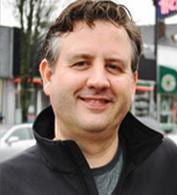For the first time in 32 years, a gay MP will not represent BC’s Burnaby-Douglas riding in the House of Commons.
None of the parties contesting the riding in the May 2 federal election is fielding a gay candidate, not even the NDP, which produced Svend Robinson then Bill Siksay, who have represented Burnaby-Douglas, respectively, since the late 1970s.
Robinson, who was elected to the House of Commons for seven consecutive elections, from 1979 to 2004, came out in 1988, becoming the country’s first openly gay MP.
Siksay, a former assistant to Robinson, succeeded him as MP for Burnaby-Douglas following the June 2004 election and was returned to Parliament in the January 2006 and October 2008 elections.
On Feb 26, Simon Fraser University public policy professor Kennedy Stewart, who is straight, became the NDP’s MP-heir apparent after Siksay announced he would not run for Parliament again in December.
“I don’t know if they looked for one specifically,” says Siksay when asked if the NDP searched for a gay candidate to follow in his and Robinson’s footsteps. “No openly queer candidate ran for the nomination, I guess, is the short answer,” he adds. “I know it was a very broad search.”
That no gay candidate emerged to succeed him does not reflect badly on the riding or the party, Siksay says. Burnaby has done its part in “faithfully” electing openly gay MPs with mandates to raise issues of importance to the queer community in Canada, he observes. And there are gay candidates running in other ridings, he points out.
In BC alone, the seemingly invincible Libby Davies, who has had a lock on the Vancouver East riding in the last five federal elections she has contested, is joined by three more gay NDP candidates running May 2: Randall Garrison (Esquimalt-Juan de Fuca), Victor Elkins (Vancouver Quadra) and Piotr Majkowski (Langley). In Ontario, out lesbian Diana Andrews is contesting the Etobicoke North riding, also on the NDP’s behalf.
“We contacted a whole bunch of people, and we had three candidates come forward and we didn’t get a GLBT candidate,” says NDP’s Burnaby-Douglas riding association president Lil Cameron. “It was certainly one of the areas we looked for — it wasn’t the only one.”
Apart from Stewart, teacher Sam Schechter and writer and radio host Alnoor Gova also vied to replace Siksay as the riding’s candidate.
Before the NDP holds nominations, it has to seek and encourage affirmative action candidates, including women, Aboriginal, queer or any under-represented groups, says Davies, who is also the NDP’s deputy leader. “At the end of the day, those are the candidates that came forward.”
“We had a very vigorous nomination campaign,” Siksay adds. “I think that those of us who heard Kennedy speak at the nomination campaign and saw the platform that he put out there, knew that he valued the legacy of this riding and wanted to carry on that tradition.”
“The main thing is to make sure human rights protections are strengthened, and a lot of Bill’s work centred around that,” Stewart says.
“When people are not being treated equally, you’ve got to go above and beyond. It’s not just equal opportunity that’s needed here; it’s equality of outcome.
“We can talk about specific policies, but the absolute best thing we can do is to get people involved in the democratic system,” Stewart adds.
Davies believes Stewart will be an excellent candidate, but hastens to add that both personally and politically she’s “very, very sorry to see Bill Siksay go.”
Like Siksay, she notes the presence of other openly gay candidates running in the upcoming election. The NDP does have a successful record on queer issues and getting queer candidates elected, Davies contends. “We’re the party that’s out there, no pun intended.”
Cameron says Stewart is supportive of that record and emphasis, noting he has signalled his willingness to pick up the Bill C-389 baton, otherwise known as the trans bill that Siksay championed, if nobody else does. “Sure, I would do that,” says Stewart, but notes “there may be other folks who may be better placed to bring that forward.”
Davies says she’s eager to reintroduce the bill if reelected. “I’m not going to let it go.”
Siksay is already hopeful a new Parliament will see the resurrection of the bill that was in limbo in the Senate and died with the election call. Eleven fellow NDP MPs as well as three Liberal MPs seconded it in the last Parliament, he notes.
Siksay says it’s ultimately the responsibility of “folks in the queer community” to work for their liberation. “I don’t think any ally, despite their best intention, has the same impetus towards that, and that’s not to belittle the contributions of many strong allies,” he adds.
“It would be nice to have more than four or five members of the House of Commons representing the queer community,” Siksay says.
Stewart will square off against Conservative candidate Ronald Leung, who came within 800 votes of defeating Siksay in the 2008 election, Liberal Ken Low and Green Party candidate Adrianne Merlo in the Burnaby-Douglas riding.


 Why you can trust Xtra
Why you can trust Xtra


